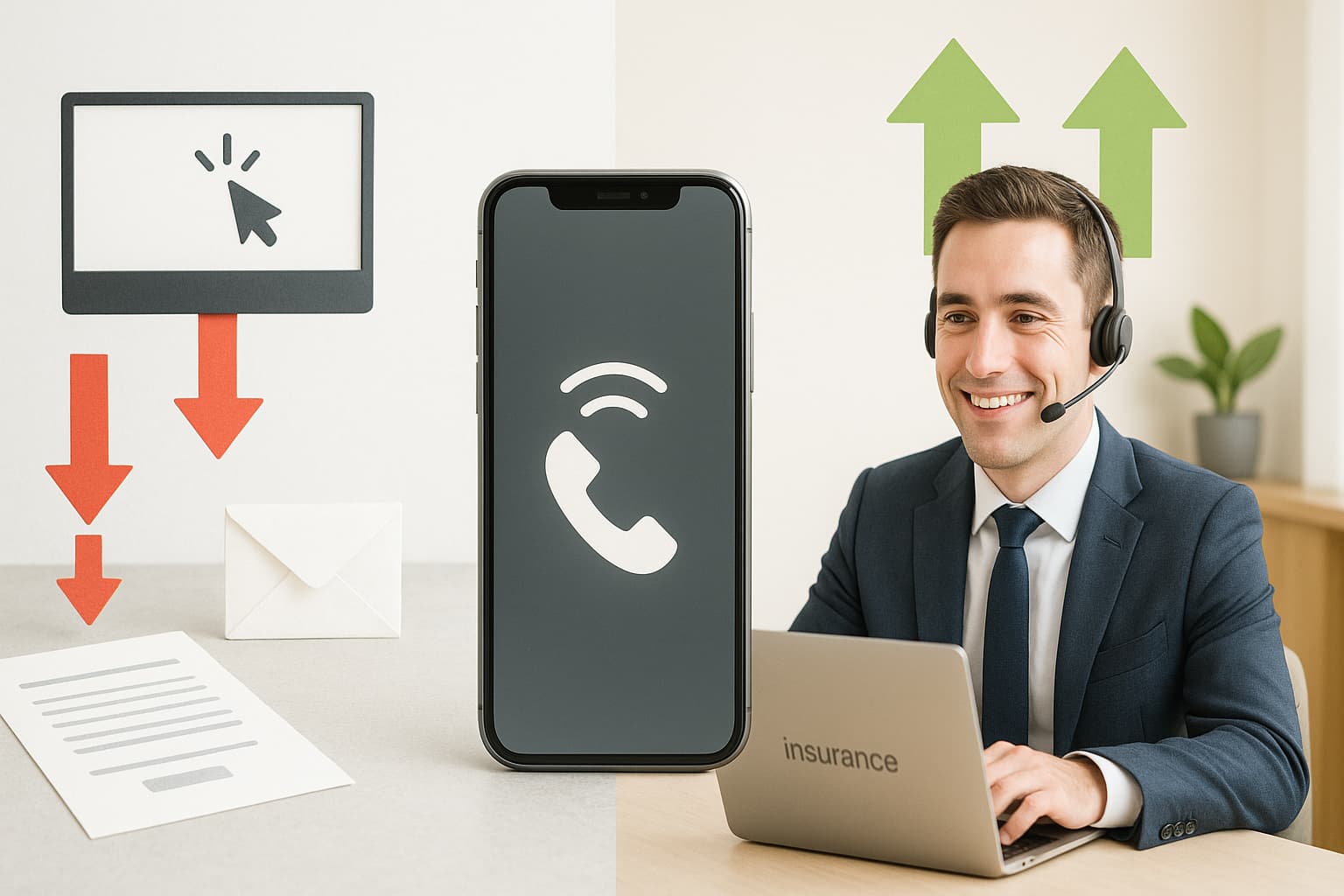How to Get Pay Per Call Health Insurance Leads
Health insurance agents face tough competition. Getting quality leads is hard. Pay per call marketing helps solve this problem by connecting you with potential customers who want to buy.
Pay per call works differently than other ads. Instead of paying for clicks, you pay for phone calls. When someone calls, they're ready to talk about buying insurance. These calls convert 10 to 15 times better than web leads.
This guide shows you two ways to use pay per call for growing your business. You can build your own system or hire an agency. Both work, but each has different benefits and challenges.
Table of Contents
Why Pay Per Call Marketing Works for Health Insurance Leads
Understanding Costs and Results
Digital Marketing: Building Your Own Lead Generation System
Working with Pay Per Lead Generation Companies
Staying Legal and Compliant
Measuring Your Success
Why Pay Per Call Marketing Works for Health Insurance Leads
Health insurance is complicated. People have questions about coverage, costs, and providers. They want to talk to someone who can explain their options. This is why high quality lead generation for health insurance depends on real conversations.
Integrate pay per call into your complete marketing strategy with a proven 4-step guide to health insurance lead generation that combines multiple channels for maximum lead flow.
Here's why phone calls work so well:
People prefer talking for complex purchases. Over 78% of insurance shoppers call a business after searching online. They want real answers, not just website text. Whether they need ACA leads for sale situations or Medicare leads, phone conversations build trust.
Mobile searches lead to calls. More than 50% of insurance searches happen on phones. Click-to-call buttons make it easy for people to connect.
Callers are ready to buy. When someone takes time to call, they're serious about getting coverage. They're not just browsing. These real time conversations with motivated prospects convert much better than cold outreach.
You can build trust quickly. Phone conversations let you address specific concerns and show your expertise. This builds confidence faster than emails or web forms.
What Makes Calls Convert Better
Phone calls work because they're personal. You can:
Answer specific questions about their health needs
Explain complex plan details in simple terms
Address budget concerns with real solutions
Build trust through helpful conversation
Generate Medicare supplement leads and commercial insurance leads effectively
Understanding Costs and Results
Pay per call leads cost more upfront than other types. But they're worth it because they convert better.
Typical Costs
Health insurance calls usually cost $20 to $100 each.
Some agencies report costs between $35 and $100 per lead.
Here's what affects the price:
Type of insurance: Medicare calls often cost more than regular health plans
Location: Competitive areas have higher prices
Call quality: Longer calls with better prospects cost more
Timing: Open enrollment periods drive prices up
Competition: Popular keywords increase costs
Why Higher Costs Make Sense
Yes, $50 per call sounds expensive. But consider this:
Web leads might cost $10 but convert at 2%
Phone leads cost $50 but convert at 30%
The phone lead is actually cheaper per sale. Plus, phone customers often buy bigger policies and stay longer.
For comparison, other healthcare marketing can cost $361 per lead, and business insurance averages $424 per lead.
Real Conversion Numbers
Industry data shows phone calls convert around 30% for insurance. That's much higher than:
Email leads: 2-5%
Web form leads: 5-10%
Social media leads: 1-3%
Aged life insurance leads: 5-15%
Digital Marketing: Building Your Own Lead Generation System
Building your own system gives you more control. You choose the keywords, write the ads, and handle the calls directly. This approach to generating leads puts you in charge of your marketing efforts.
Step 1: Plan Your Campaign
Set clear goals: How many calls do you want per month? What types of insurance will you focus on? Consider whether you want free insurance leads or prefer to pay for higher quality prospects.
Know your audience: Are you targeting Medicare shoppers, families needing ACA plans, or small businesses? Different audiences require different marketing strategies.
Set your budget: Plan for ad costs, software, and staff time. Start with $2,000-5,000 per month to test what works.
Step 2: Choose Your Keywords
Focus on keywords that show buying intent. These help you appear in search results when people are ready to buy:
High-intent words: "health insurance quote," "Medicare plans near me," "ACA enrollment help"
Local terms: Add your city and state to target nearby customers
Maximize your local visibility beyond paid ads by learning how to get health insurance leads with local SEO strategies that capture organic search traffic in your service area.
Plan-specific terms: "Medicare Advantage," "health insurance for self-employed," "family health plans"
Problem-focused terms: "lost health insurance," "turning 65," "changing jobs"
Start with 20-30 keywords and expand what works. Good Medicare marketing ideas often focus on local search terms.
Expand your Medicare marketing reach by learning how to get Medicare leads with Youtube educational content that builds trust and drives qualified prospects to call your agency.
Step 3: Write Compelling Ads
Your ads need to grab attention and encourage calls. Here's what works:
Lead with benefits: "Find Affordable Health Coverage Today"
Address pain points: "Confused by Medicare Options?"
Include clear call-to-action: "Call Now for Free Quote"
Show you're licensed: "Licensed Insurance Agent"
Example ad: "Turning 65? Understand Your Medicare Options. Call [Your Agency] - Licensed Insurance Agents. [Phone Number]."
Step 4: Create Simple Landing Pages
Even though you want phone calls, you still need good landing pages. Keep them simple:
Match your ad headline
Show your phone number prominently
Include trust signals like licenses and testimonials
Make it mobile-friendly
Remove distractions
This works for any services business, not just insurance.
Enhance your landing page conversions by learning how to get more health insurance leads with 1 simple quiz that pre-qualifies prospects before they call.
Step 5: Set Up Call Tracking
You need software to track which ads generate calls. Look for:
HIPAA compliance (required for health info)
Call recording features
Real-time reporting
Integration with your current systems
Popular options include Nimbata and Emitrr for insurance agencies.
Step 6: Train Your Team
Your agents need scripts and training to handle calls well:
Opening script: "Thank you for calling [Agency]. This is [Name], a licensed insurance agent. How can I help you today?"
Qualification questions: Ask about their current coverage, health needs, and budget
Compliance requirements: Record calls and give required disclosures
Follow-up process: Get contact info and set clear next steps
Working with Pay Per Lead Generation Companies
Hiring an agency can be faster and easier. They handle the ads and send you qualified calls. But you need to choose carefully among lead generation services.
Finding the Right Agency
Look for lead generation companies that specialize in insurance. Ask these questions:
About their leads: "Where do your calls come from? Google ads, Facebook, social media, or other sources?"
About quality: "How do you screen calls before sending them to me?"
About compliance: "How do you handle TCPA and HIPAA requirements?"
About pricing: "What counts as a qualified call? What's your refund policy for bad leads?"
Understanding Agency Pricing
Agencies typically charge per qualified call. Prices range from $20-100 depending on:
Insurance type (Medicare costs more)
Call length requirements
Geographic targeting
Exclusivity (exclusive leads cost more)
Some agents prefer free life insurance leads for agents, but paid leads often convert better.
Managing Your Agency Relationship
Once you pick an agency:
Set clear expectations: Define what makes a good call for your business
Monitor performance: Track how many calls turn into sales
Give feedback: Tell them which calls convert and which don't
Review reports: Check call sources and quality metrics monthly
Staying Legal and Compliant
Insurance marketing has strict rules. Breaking them can cost you big fines or your license.
Key Laws to Follow
TCPA (Telephone Consumer Protection Act):
Get permission before calling cell phones
Honor do-not-call requests
Only call between 8 AM and 9 PM
HIPAA:
Protect health information shared on calls
Use secure systems for call recording
Sign agreements with vendors who handle health data
FTC Rules:
Don't make false claims about plans
Clearly identify yourself as an insurance agent
Include required disclaimers in ads
CMS Medicare Rules:
Record all Medicare sales calls
Get proper consent before presentations
Don't claim government affiliation
Best Practices for Compliance
Document everything: Keep records of consent and call recordings
Train your team: Make sure everyone knows the rules
Update regularly: Laws change, so stay current with new requirements
Work with compliance experts: Consider hiring help for complex regulations
Measuring Your Success
Track the right numbers to know if your campaigns work.
Key Numbers to Watch
Call volume: How many calls are you getting?
Answer rate: Are you missing calls?
Cost per call: What's each call costing you?
Conversion rate: How many calls become sales?
Return on investment: Are you making money?
Improving Your Results
Use your data to make campaigns better:
Test different ads: Try new headlines and offers
Adjust keywords: Stop using words that don't work
Improve call handling: Train agents on better scripts
Optimize timing: Find when your best customers call
Refine targeting: Focus on areas that convert best
Monthly Review Process
Every month, review:
Which campaigns generated the most sales
What times and days work best
Which agents convert calls at the highest rate
Where you're spending too much for poor results
Make changes based on what you learn. Small improvements add up to big results over time.
Final Thoughts
Pay per call marketing works for health insurance because people want to talk before they buy. Whether you build your own system or hire an agency, focus on quality over quantity.
Start small, test what works, and scale up successful campaigns. Always follow compliance rules - they're not optional in insurance.
Remember: every call is a person who needs help with their health coverage. Provide real value, build trust, and the sales will follow.
The insurance market is competitive, but pay per call gives you a direct line to motivated buyers. Use it wisely, and it can become your best source of new business.
If you want to get pay per call insurance leads today, sign up with ResultCalls for free!

Alex Gambashidze
Marketing Associate at ResultCallsHello everyone! My name is Alex and I write these blogs to help educate small business owners on different ways to grow their business. My goal is to make lead generation as easy as possible for you. After reading these blogs, I hope you leave with some actionable steps that will get you closer to growing your business :)
2,000+
Happy local businesses
See what some of them have to say.

